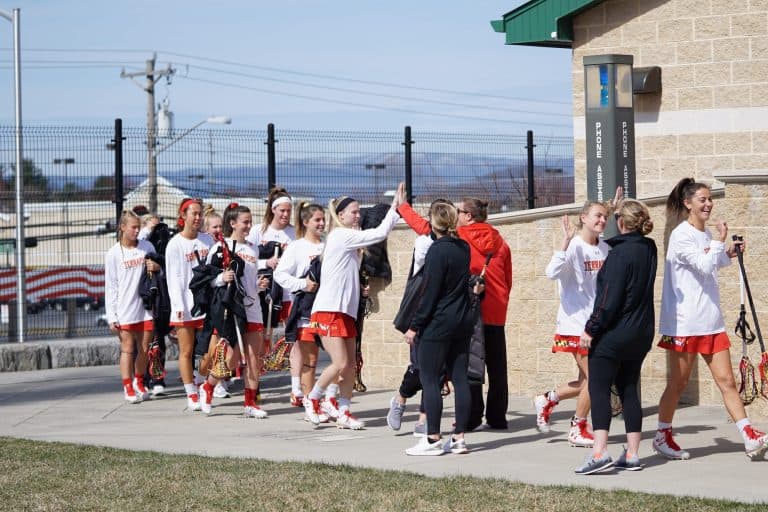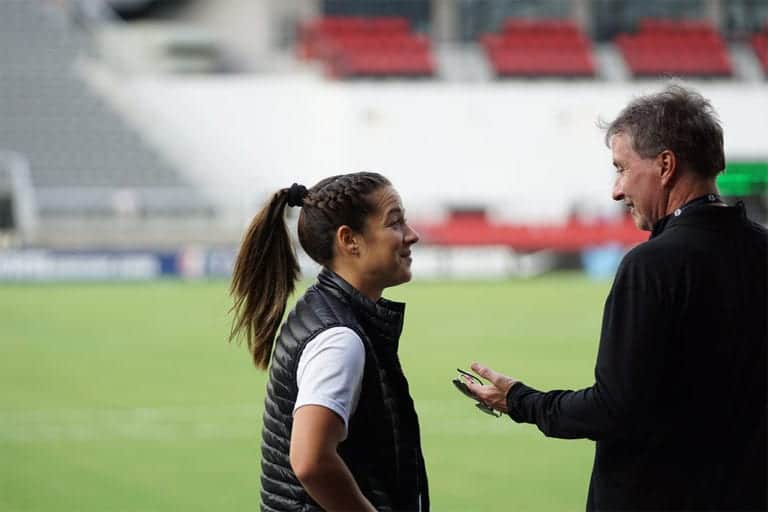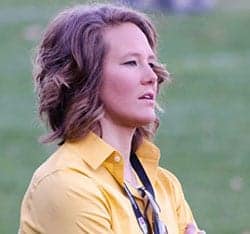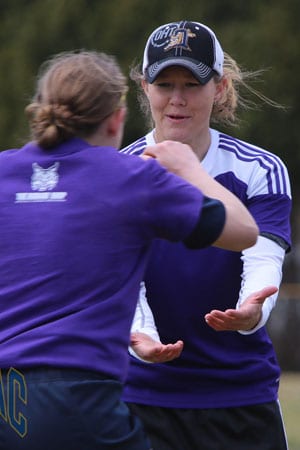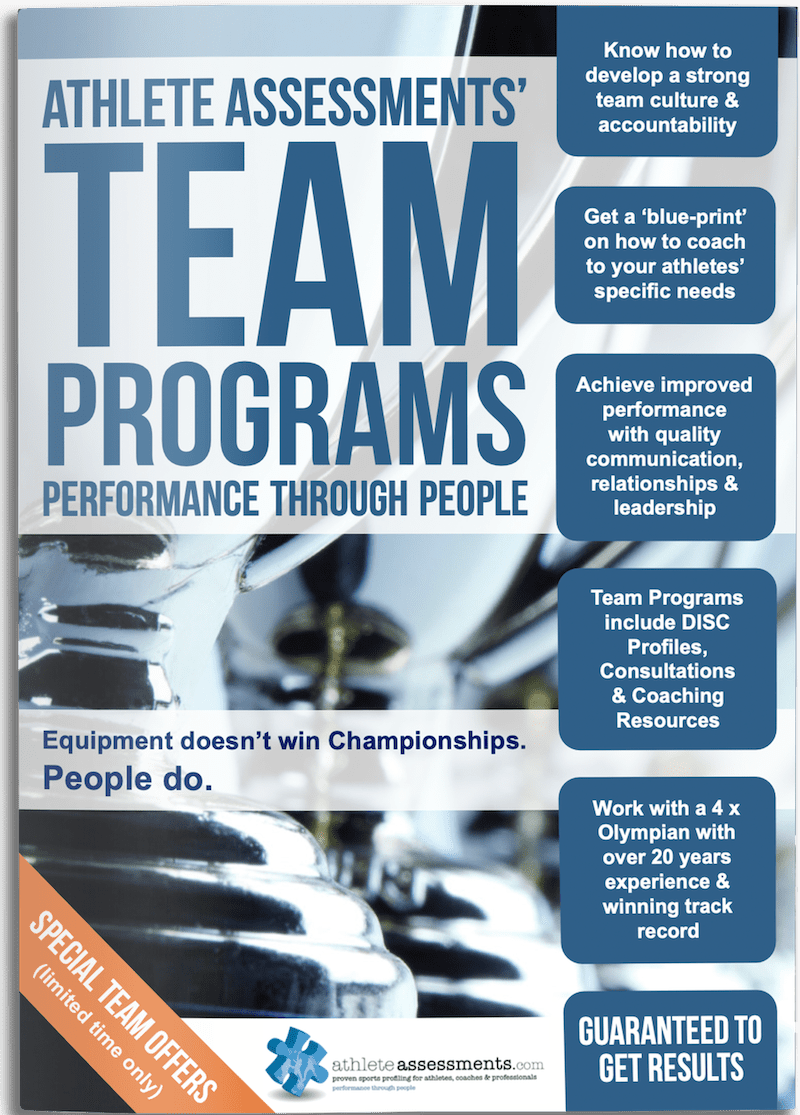“From the moment I was hired in 2010 there was such a stigma to explode and be seen as a force to be reckoned with,” shared Coach Becky Carlson, Head Coach of Quinnipiac University Women’s Rugby, when we sat down with her to reflect on all that she and the sport of women’s rugby has achieved since that moment.
12 years on from being recruited as the first Division One Women’s NCAA Rugby Coach in the United States, and with three back-to-back championships under her name, Coach Carlson shared insights into the way she has consistently developed championship standard athletes and a dynamic culture robust enough to thrive in the evolving landscape of a burgeoning sport.
Also known as the Fearless Coach, a title earned not only from her dedication to building the sport of rugby, but also in her commitment to advocating for her profession and empowering other coaches and administrators to speak out. Her podcast, following the same title, reinforces just that, addressing the often unspoken challenges coaches face and creating a platform for them to feel heard.
Reflecting on her own experience building a program and ultimately a sport from the ground up, Coach Carlson shared,
“There is something really attractive about starting something. I say to my athletes in recruiting, ‘You are building something. We only have 27 NCAA teams, women’s rugby is not a full championship sport yet, we are still in our infancy. Look at where other sports are right now, lacrosse, soccer, basketball, they are all built. You are part of something that is scaling to have more effect on the identity of rugby in the United States.’.”
Explaining that initially all of her players were walk-ins, Coach Carlson recalled that the only requirement to be recruited into her program was that they were multi-sport athletes. Whilst the criteria was broad and athletes were funneling into her program from a diverse cross section of sports, Coach Carlson knew exactly the type of athlete she was looking for. Within two years of establishing the program, the emerging team competed at Nationals and after five years, the team won their first National Championship.
Now into her second decade leading the game, Coach Carlson has a profound ability to adapt and understand her players. She role models the importance of understanding the individual and the outcomes effective communication can achieve, complementing her experience with the use of Athlete Assessments’ DISC Profiles. She highlights that by knowing and then harnessing an athlete’s natural style, she is able to help them in applying effective performance enhancing strategies, and Athlete Assessments’ DISC Profiles provide a tangible and structured way to discover and then apply this knowledge.
Taking her approach one step further, Coach Carlson uses her knowledge of the differences between her athletes to motivate, applying her understanding of what is meaningful to them, and exactly how they like to be coached to draw their best performances. We’ve previously shared insight into her development of this ability.
Coach Carlson also shared that the culture underpinning her program is founded on self-awareness and embracing the unique distribution of strengths which belong to every athlete. Naturally, having each athlete undertake their AthleteDISC Profile when they join the program, is a critical component for team members to buy into.
From our experience and as Coach Carlson demonstrates, the most successful coaches are those who can adapt to a diverse range of environments and athletes, refining their coaching skills to suit each individual, rather than just themselves. This means that despite differences, these coaches can still draw best performances from their people.
Sharing an on-field example, Coach Carlson reflected on a communication challenge that presented with an athlete whose position was as a prop. For those unfamiliar with positions in rugby, props are among the strongest players on the field and their role requires them to run straight and provide the platform at the scrum, directing the force of it. Coach Carlson recalled that even though this player was a force to be reckoned with, both physically and skillfully, she was being pulled up by opposition players half her size. Coach Carlson explained that her athlete, while playing in an aggressive position on the field, was reluctant to hurt anyone or be formidable, and did not respond to the stereotypical, “Let’s go crush the opposition!” style of motivation.
When the team undertook DISC Profiling, it became apparent that the athlete had a Natural DISC Style high in Steadiness ‘S’ and Conscientious ‘C’, with an on-field adapted style high in ‘C’. Being a natural ‘S,’ meant that she had a team-first mentality, was protective of the people around her, desired connectivity and to perform well. The ‘C’ in her profile represented a need for structure, cautious approach, and a preference for indirectness, which intensified once on the field.
Knowing the athlete’s preferences meant Coach Carlson was able to adjust her approach to appeal to the athlete’s style. This meant giving specific instructions, rather than empowering her to take down the opposition using her strength and physicality. Coach Carlson shifted her approach to give instructions such as,
“Your job is to get five meters at a time. Every single time you have the ball I need you to get five meters, have a perfect post and then I need us to recycle the ball to keep possession.”
Coach Carlson added,
“After that discussion, the player would go out and get 10 meters. In that season she broke a record that still exists today. It had zero to do with me rewiring her mentality, and all to do with me working out what she needed from me. She needed me to be really clear about her role and the expectations around her performance. Once we drilled it down, that was all she had to do, she was an absolute star.”
Another common occurrence, particularly in team environments is that when communication happens naturally between two styles that are similar, this can often leave others out and cause misunderstanding. Coach Carlson shared a situation where the dynamics of her team had a fly-half and outside center who were a ‘DC’ (Dominance and Conscientious) and an ‘ID’ (Influence and Dominance) respectively, while the inside center, was an ‘S’ (Steadiness).
While the inside center’s role is to set up the play, pass the ball to the outside center, and push the ball to the edges, in this situation the athlete was unintentionally, but regularly, being left out of communication. This was due to the similarities in the fly-half and outside center’s ‘D’ profiles which meant that these two players were comfortable with very direct, outcome driven, and fast communication. In contrast, the ‘S’ style inside center operated at a slower pace, was relationship focused, and preferred collaborative communication.
When the team completed their AthleteDISC Profiles, the differences in the players’ profiles helped unpack the situation. The ‘S’ athlete shared she had always felt the ‘D’s didn’t like her or were mad at each other, while the ‘D’s explained how they preferred to communicate and deal with situations head-on.
Coach Carlson added,
“The ‘D’s were choosing to communicate as they were, and the ‘S’ was not able to keep up with that level of directness so she would just go silent. It was upsetting her as she thought the two of them hated each other, but in truth they got along just fine!”
She continued by highlighting that as the coach, it was her role was to get them to understand each other and lead them to resolving the situation in a way that achieved the best outcome for the team. Coach Carlson first spoke to the ‘D’ athletes, explaining that even if they were being direct, they needed to include their inside center as she is essential to the team. Coach Carlson suggested that the ‘D’ players could use phrases such as, “Do you need anything from me?” or, “We’re good, you good?”
After ensuring the ‘S’ understood that her teammates were not in conflict, but instead acting in accordance with their DISC styles, Coach Carlson could discuss the role she also played in being included, noting she had to be prepared for the pace.
Coach Carlson’s serially successful program doesn’t just rely on her ability to identify and adapt her approach with her players, but also with her administration staff and other sports professionals as well. She explained how understanding others not only catalyzes effective communication, but also opens the possibility of creating situations which make them feel comfortable.
“We are re-shaping how we have conversations with people. I think DISC adds compassion back into the equation, and when our brains go to the place of assumption or just our own needs, we may not think about the other person’s needs or preferences.”
Coach Carlson used the example of an athletic trainer who was working with her team and many other teams within the university, who she had identified as being a high ‘I’ (Influence) because of her people orientation, personability, faster pace, and desire to be liked by others.
While Coach Carlson valued the professional knowledge of the athletic trainer, her involvement in the team had become challenging as she was regularly sitting multiple players out with little explanation. Coach Carlson noted that on the surface, an outside observer would just see the athletic trainer sitting players out and forcing them to take time off, with no benefit to the athletes or team. However, Coach Carlson was able to apply her knowledge of DISC and develop an understanding of the stressors that could be causing the trainer to act in this way.
Coach Carlson explained,
“Within the university there was a shortage of every type of personnel, so even when the athletic trainer had time off from us, she was with another team. As a result, she was pulling players because she was so exhausted and didn’t have the time or prior knowledge to understand what was appropriate for rugby and return to play. It was just easier to keep players out.”
After asking the exhausted athletic trainer how she was going, she seemed at breaking point, so Coach Carlson chose to share some of her wisdom with her, adding,
“I said, ‘Listen to me. No matter what coach you’re working for, whether it’s a men’s team or a women’s team, whatever the profile that coach has, I want you to advocate for yourself. Say that you need time off because when you’re not at your best, the team doesn’t get your best, and then we don’t perform at our best.’.”
Being ‘the best’ in sport or in any role, often requires us to change and try different techniques. While coaching knowledge comes through hard fought and earned experience, it can also come indirectly by learning about other people’s experiences and how they choose to approach others and situations. Despite her decades of experience, Coach Carlson continues to develop her extraordinary ability to elevate performance. Her fearlessness connects with a diverse range of people across the sporting industry, inspiring others to do the same.

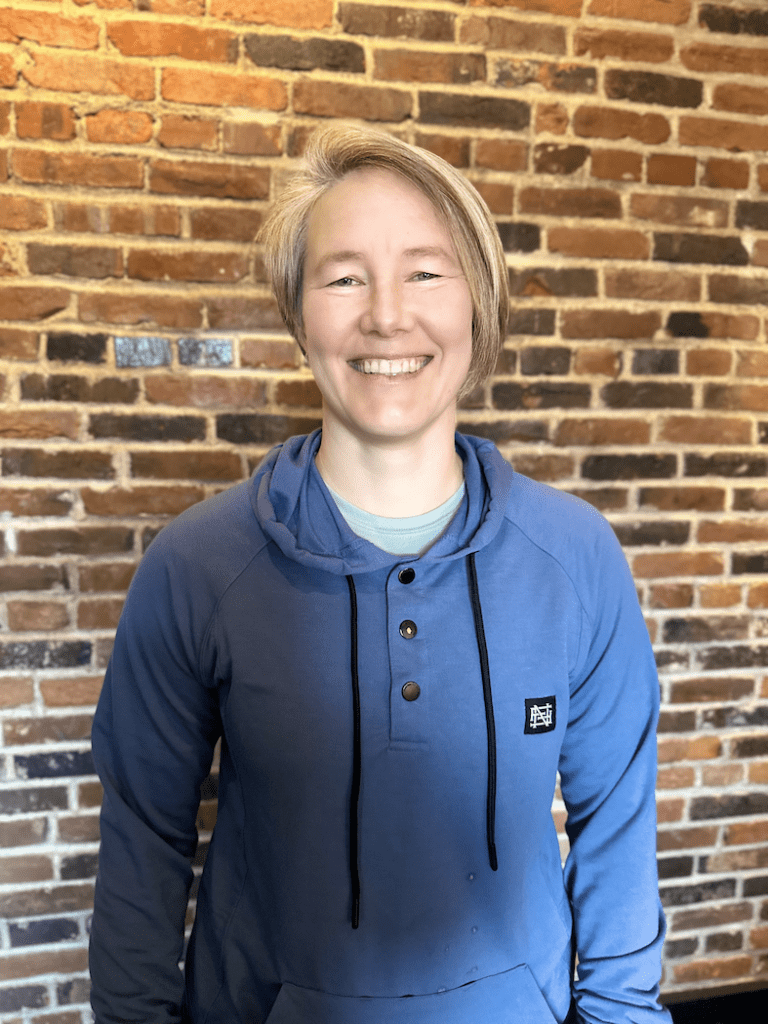
Biography for Becky Carlson
Coach Becky Carlson has been Head Coach of the Division One Women’s Rugby program at Quinnipiac University in Hamden, Connecticut since its formation in 2010, and has led her team to three back-to-back National Championships during this time. Her pioneering program has been emulated and scaled at the NCAA level throughout the country, and she continues to be instrumental in the development of women’s rugby in the United States, having previously held the position of Emerging Sports Program Manager at USA Rugby. Becky is also the creator of the successful podcast The Fearless Coach. As a multi-sport Division One athlete herself, Coach Carlson successfully made the transition from tennis to one of the first collegiate women’s rugby programs. As a graduate of the NCAA Women Coaches Academy, Coach Carlson’s passion for women coach development continues to provide a voice and mentoring role within the growing community of women’s coaches worldwide.
Where to from here?
If like Coach Carlson, you would like to incorporate Athlete Assessments DISC Profiles into your team and program to raise self-awareness and improve team dynamics, our Elite Team Program includes DISC Profiling of individual athletes, the coaching team, and any sports professionals, alongside dedicated, tailored team consultation sessions.
DISC provides a framework to understand ourselves and others, enabling us to develop more effective relationships with the people around us. If like Coach Carlson, your people rely on you to bring them the most effective and reliable tools available we encourage you to reach out and contact us!
LOVE THIS ARTICLE?
DOWNLOAD YOUR FREE, PRINTABLE PDF COPY BY FILLING OUT THE FORM BELOW!
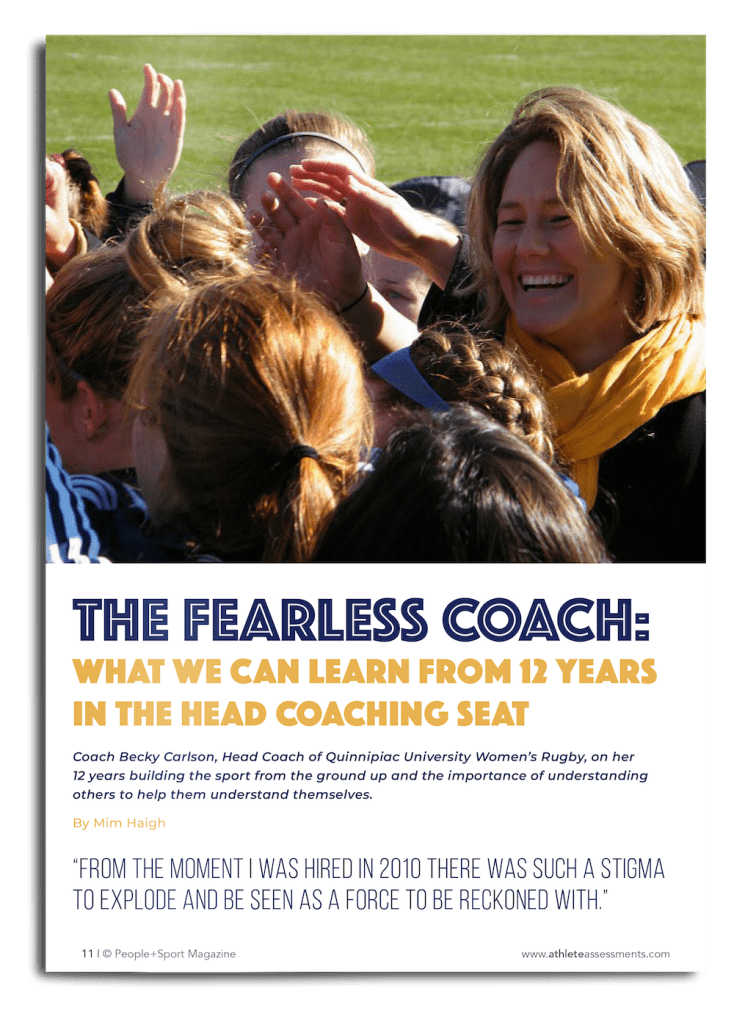
Recommended Articles
A panel of expert head coach developers joined us for a recent webinar, in this article we debrief their discussions on why proactivity, self-awareness, and understanding coaching needs, are the key to progressing in your coaching career.
In any industry, recruiting the right person to join your team is a challenging task, but when done right can be extremely rewarding. We spoke to a panel of head coaches who are experts in recruiting assistant coaches for their own programs. Think of this as the how-to for recruiting the right assistant coach, the effects it has on team culture, and why it’s part of a head coach’s role to get it right.
A personal insight by Becky Carlson into the journey to extraordinary coachingMany Coaches can pinpoint their AHA moments. Their moments of sudden realization, inspiration, or insight into better coaching. These moments often coincide with a renewed commitment to their…
Congratulations to Quinnipiac University’s Women’s Rugby team who have finished an exceptional 2015 season by winning the inaugural varsity National Championship. In this article, Head Coach Becky Carlson shares her secrets to success.
Since moving to Quinnipiac University from her position with USA Rugby as an Emerging Sports Program Manager in 2011, Head Coach Becky Carlson has led her team to uncharted success, and has dramatically changed the landscape of Women’s Rugby in the United States. Before becoming the 2015 Champions, the Bobcats had competed in three of the previous four National Championship games, demonstrating that Coach Carlson has already forged a legacy of excellence at Quinnipiac.


